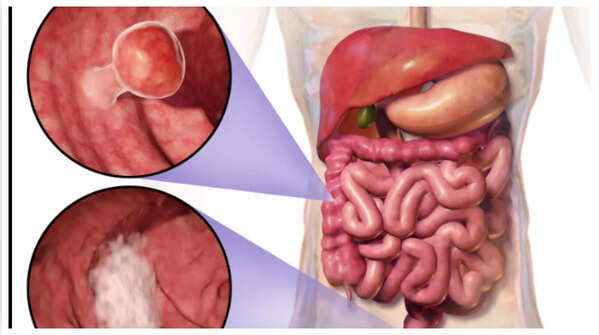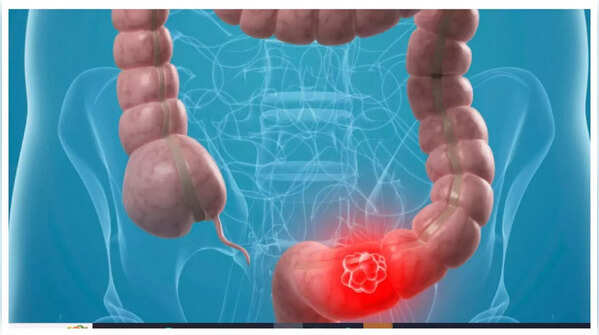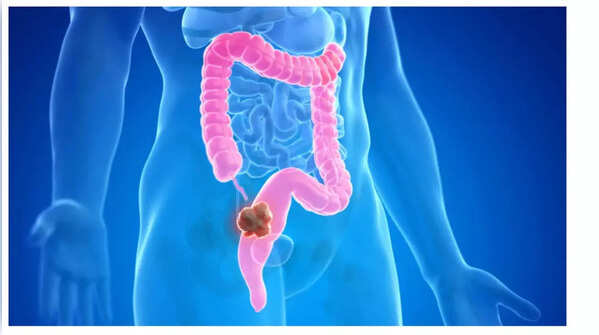Colon cancer, also known as colorectal cancer, is a serious disease that develops in the colon or rectum. It often begins as small, noncancerous clumps of cells called polyps, which can become cancerous over time. While most cases occur randomly, factors like family history, obesity, and lifestyle can increase the risk. Recognizing early symptoms is crucial for timely intervention.

One of the earliest indicators of colon cancer is a change in bowel habits. These changes may include:
Image: Illustration of bowel changes, a key early sign of colon cancer
While these changes may seem insignificant and could be attributed to diet, stress, or minor infections, persistent alterations lasting more than a few days warrant medical attention. These persistent changes may be indicative of a growing tumor disrupting normal bowel function.

The presence of blood in the stool is a symptom that should never be ignored. It can manifest in several ways:
Image: Visual representation of blood in stool, highlighting the importance of seeking medical advice
In some cases, the bleeding may be minimal and undetectable to the naked eye, potentially leading to anemia over time. While blood in the stool can result from conditions like hemorrhoids or infections, it is essential to rule out colon cancer, especially if it occurs repeatedly or alongside other symptoms.

Abdominal discomfort is another early symptom often overlooked. This can include:
Image: A person experiencing abdominal pain, a potential sign of colon cancer
Such discomfort can easily be mistaken for indigestion or other minor digestive problems. However, if the pain is persistent and not related to dietary or lifestyle changes, it could be a sign of a tumor causing irritation or blockage in the colon.

Unexplained and persistent fatigue and weakness can be subtle indicators of colon cancer, particularly when accompanied by other symptoms. This occurs because slow, unnoticed bleeding in the colon can lead to iron deficiency anemia.
Image: Depiction of fatigue and weakness, symptoms that should not be ignored
A decrease in red blood cells impairs the body's ability to transport oxygen, resulting in fatigue, shortness of breath, and general weakness. While these symptoms can be attributed to stress or lack of sleep, a medical evaluation is warranted.

Unexplained weight loss is a common symptom associated with many cancers, including colon cancer. When the body is combating cancer, the immune system operates at an elevated level, and tumors can interfere with digestion and appetite.
Image: Illustration of rapid weight loss, a warning sign of potential health issues
Significant weight loss without intentional changes in diet or exercise should prompt a visit to the doctor. While this symptom often appears in later stages, it can sometimes serve as an early warning sign.

Important Considerations:









Disclaimer: This article is for informational purposes only and does not substitute professional medical advice. Always consult with a qualified healthcare provider for any health concerns or before making any decisions related to your health or treatment.
Sources:
Newer articles
Older articles
 Earth's Spin Accelerating: Scientists Predict Potential 'Negative Leap Second' by 2029
Earth's Spin Accelerating: Scientists Predict Potential 'Negative Leap Second' by 2029
 5 Subtle Signs of Cervical Cancer Women Often Miss
5 Subtle Signs of Cervical Cancer Women Often Miss
 Hair Oil vs. Hair Serum: Choosing the Right Treatment for Your Hair Type
Hair Oil vs. Hair Serum: Choosing the Right Treatment for Your Hair Type
 Steven Smith Targets Test Return After Unique Baseball Cage Recovery in New York
Steven Smith Targets Test Return After Unique Baseball Cage Recovery in New York
 Bollywood's Enduring Fascination with Indian Mythology: From Ramayana to Modern Blockbusters
Bollywood's Enduring Fascination with Indian Mythology: From Ramayana to Modern Blockbusters
 Liver Disease: 5 Subtle Warning Signs You Shouldn't Ignore
Liver Disease: 5 Subtle Warning Signs You Shouldn't Ignore
 Heart Attack Warning: Key Signs That Can Appear Weeks in Advance
Heart Attack Warning: Key Signs That Can Appear Weeks in Advance
 New Zealand Announces Packed Home Cricket Schedule Featuring Australia, England, West Indies, and South Africa
New Zealand Announces Packed Home Cricket Schedule Featuring Australia, England, West Indies, and South Africa
 Wimbledon Upset: Bhambri & Galloway's Doubles Run Halted in Tiebreak Thriller
Wimbledon Upset: Bhambri & Galloway's Doubles Run Halted in Tiebreak Thriller
 Daren Sammy Fined, Receives Demerit Point for Third Umpire Criticism After Test Match
Daren Sammy Fined, Receives Demerit Point for Third Umpire Criticism After Test Match